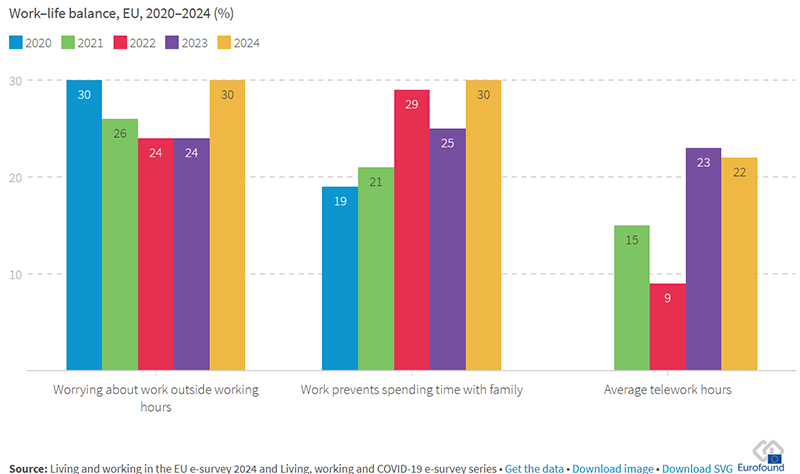Work–life balance continues to be a significant research topic for Eurofound, in its surveys and other studies.
Podcast
Listen to or watch a recording of our International Women's Day 2023 podcast on the work–life challenges of women and men.
Survey data on work–life balance issues
Eurofound’s European Quality of Life Surveys (EQLS) provide comparisons between countries on the reconciliation of work and family life, flexible working time arrangements and the provision of quality care services. The European Company Surveys (ECS) provide data on why and how companies make use of a broad variety of working time arrangements. The European Working Conditions Surveys (EWCS) look at the organisation of working time across the EU and issues related to it including flexible arrangements, working time preferences and work–life balance.
COVID-19 and work–life balance
Eurofound’s unique e-survey, Living, working and COVID-19, provides a snapshot of the impact of the changes that occurred during the pandemic on people’s lives, with the aim of helping policymakers shape the response to the crisis. Conducted in five rounds during 2020, 2021 and 2022, it allows for comparison of the challenges that arose during the different stages of living through the pandemic. A range of questions focus on people’s work situation, their level of teleworking during COVID-19, experiences of working from home and the impact on work–life balance.
The latest findings, published in July 2022 show that despite some improvement in work–life balance issues, there has been a sharp decline in family time among workers in 2022, with almost 30% reporting that their job is preventing them from spending time with their family, from a much lower 19% in 2020.
Working life and work–life balance
Eurofound gathers information on working life in the EU, looking at national and EU-level policies to promote work–life balance and investigating the role of social dialogue and collective bargaining in this area.
Research investigates the opportunities for working time flexibility and improved work–life balance related to digitisation and platform work, linked with the labour market integration of specific groups, such as those with care responsibilities or health issues.
In its research on working conditions and sustainable work, Eurofound has looked at the implications for work–life balance for parents and caregivers.
In the context of the negotiations on the work–life balance package at EU level, and at the European Commission’s request, Eurofound has produced a review of national statistics on the uptake of family-related leave by fathers over time across the EU Member States and Norway.










